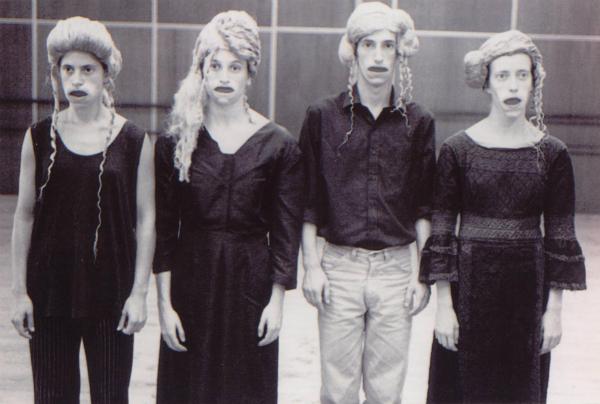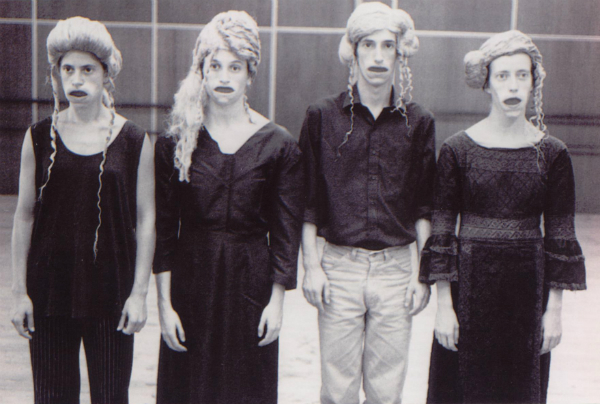
SOB
Direction
Vera Mantero
Performance and co-creation
Margarida Mestre, Paulo Henrique, Sílvia Real, Vera Mantero
Original music
Sérgio Pelágio
Set and costumes
Teresa Montalvão
Light
Paulo Graça
Ligh Operation
João Paulo Xavier
Executive production
Forum Dança / NAC
Technical direction
João Paulo Xavier
Co-production
Tejo Trust, (Springdance, Holanda, Klapstuk, Belgic, Forum Dança, Portugal) and La Ferme du Boisson (Centre d’Art et de Culture de Marne-la-Vallée, França)
Sponsors
Secretaria de Estado da Cultura, Portugal
Supports
Culturgest / Grupo Caixa Geral de Depósitos, Lisboa / Teatro Nacional D. Maria II, Lisboa / Teatro Nacional de São Carlos, Lisbon / Companhia de Dança de Lisboa, Lisbon
Thanks to
RE.AL – João Fiadeiro
Duration
60 min
Photo credit
José Fabião
She is interested in 'monstruosity', not that caused by physical deformity but the one that stems from behaviour that falls outside established rules: the way people behave, i.e., move, when unaware of or unconcerned with social appreciation.
She wants to look at the cuirass - in itself a monstruosity - as well as beneath it.
She invites the audience to look at many things that puzzle her.
She would like to understand what lies bbeneath ('sob' in portuguese) these things.
Ever since her first attempts at choreography when she was still a dancer with the Gulbenkian Ballet, through her studies in New York, her work as an independent choreographer and performer and her recent work and residency in France, Vera Mantero has been living with a lot of questions.
She has not tried to escape the inevitability of questioning many concepts surrounding dance as an art form, even though this questioning has probably quite often given her more pain than intelectual pleasure.
She acknowledges these questions - which are, of course, her questions. Because she is true to herself. And to the audience.
Gil Mendo, 1993
BENEATH THE SURFACE
In recent years one can perceive a growing worry amongst people dealing with the contemporary performing arts: are creators becoming too self-centered and withdrawn from the audiences?
One could put the question and express the worry the other way round: are the audiences withdrawing support from experimental work?
Or is this more a question of criteria of presenters and sponsors than a question of artists and audiences?
In one decade new established forms arouse out of the innovative movement that brought together artists, producers, presenters, audiences and critics in the breaking down of dogmas and bareers.
Now, as we progress into the nineties, we must still be aware of the younger artist's need to respond in their own way to the world around them and to exorcise the horrors with which their generation is faced everyday.
Difficult as it may be under the present economic pressures, we must preserve what was the greatest achievement of the eighties: that experimental and innovative work was brought out of the fringe into the light of international festivals and networks.
Fortunately there are, and hopefully there will always be, those who prefer the chalenge of a question to the comfort of the already known.
Vera Mantero's career as a performer and choreographer is paradigmatic of this. She will question herself and the world, express and share her doubts, rather than exhibit her virtuose performing skills.
It is not a matter of intelectual choice but rather one of intelectual and artistic nature: had she tried not to face these questions, they would haunt her.
As she herself puts it, she feels that 'you have to be very quiet and very still if you are to produce a gesture or a word which is not redundant'.
She will not produce a gesture when she means a word or the other way round.
She will not look for a 'dance step' to put in place of a grin or a smile.
She is researching on the puzzling and at times disquieting ways people - bodies - have of functioning.
Gil Mendo, 1993

